Name one common yet indispensable part of any business – large, small, or mid-sized, other than your customer base. Vendors – that’s the answer. From a typical business perspective, vendors are individuals or companies that supply goods and services to us or we sell our products to.
Whether you run a coffee shop or a tech company, your business entity must rely on third-party individuals or companies to sustain business operations. They are our vendors. Now, as you expand your business, the number of vendors rises exponentially – the wider becomes your product/ service range, the greater the number of vendors you will want.
Eventually, it becomes crucial to manage and keep close track of your vendors for business success. Keeping that in mind, Zoho has designed its CRM. This quality CRM helps you maintain relationships with all your Contacts – customers and vendors.
Here in this blog, you are about to get a clear understanding of vendors and how efficiently you can manage them in Zoho CRM.
Vendors include companies, people, and contractors from which your company gets products and services. They can be either direct manufacturers or resellers. Vendors sell their goods in bulk to companies. You can take food, office supplies, gadgets, or huge machinery as examples. The majority of firms rely on vendors since they need more resources to develop and deliver their equipment on a significant scale. In other words, vendors are those who provide you with complementary necessities that your company does not necessarily manufacture but requires to run smoothly.
Business is not just about your products or your customers, it is also about onboarding the right people – your marketing, sales, and support teams and also your vendors. Your business relies on your vendors for the smallest of operations. Hence, managing them is super crucial for business. With Zoho CRM in place, you can supervise and manage your company’s overall relationship with your vendors.
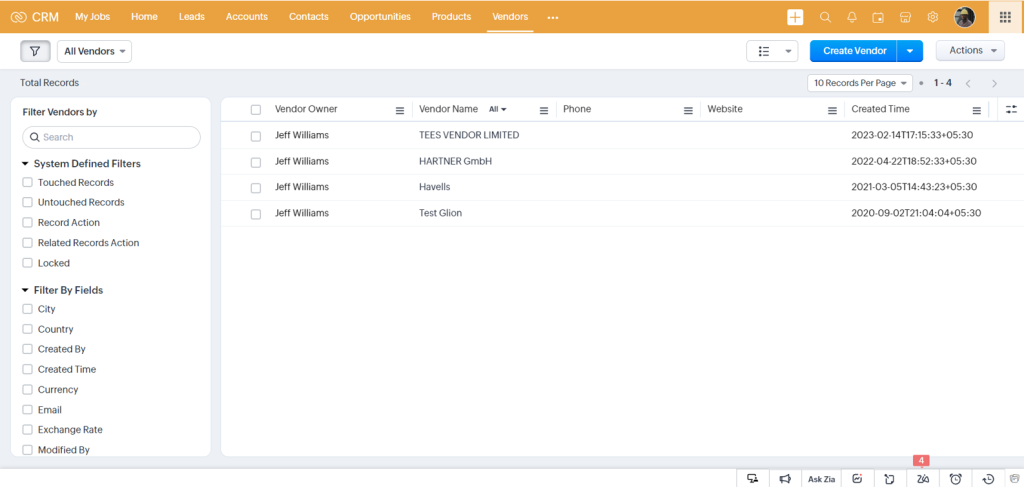
The vendor management process includes the following steps that take you toward success and better management of your business:
Zoho CRM offers two fundamental methods to add Vendors to help run your business operations smoothly.
Log into your Zoho CRM account, choose Vendors from the drop-down module list, and click the New Vendor button. When the Create Vendor page opens up, enter all the details required such as their business address, the contact information of the persons you are dealing with, products supplied /to be supplied, purchase orders for the shipments, and activities related to vendors. In addition, you can also record information about the product delivery process and attach the important documents related to each vendor. Once it is done, click Save.
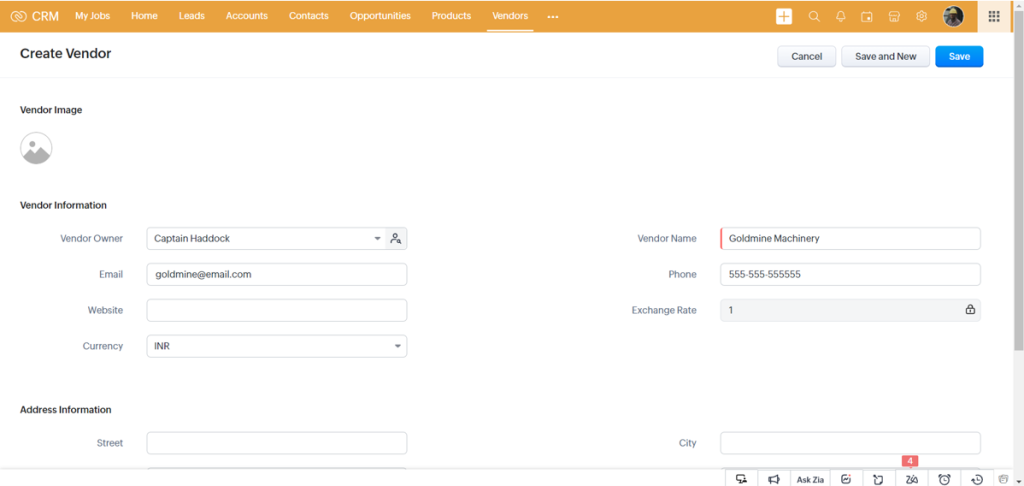
Else, you can also clone your Vendors. In the Vendors tab, select the vendor you want to be cloned. On the Vendor Details page, click Clone. When the Clone Vendor page appears on the screen, modify the required details and click Save.
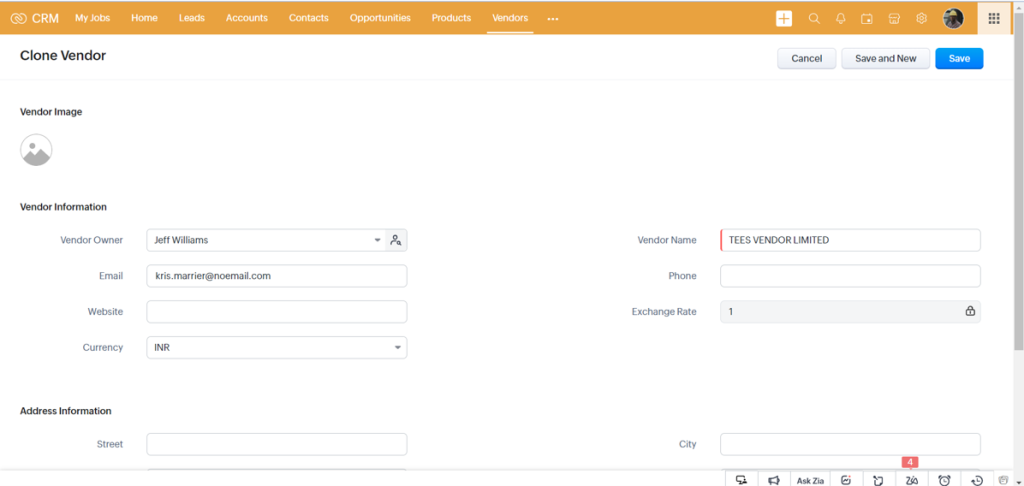
Point to note here: Some of the standard fields in the vendor records may not be visible or editable depending on your organization’s business process. If you can collaborate with the CRM administrator if want to add or modify, you can periodically update the vendors’ details and products purchased to have better visibility on your vendors/suppliers for future procurement.
If you have a handful of vendors and their details stored in external sources or record databases, you can also import them into Zoho CRM. It makes importing vendor details super-easy and helps you maintain clean data without duplicates.
You can either import individual files to the Vendors module, one at a time. Otherwise, you can use the Data Migration wizard. This wizard enables you to migrate data from other CRM systems to Zoho CRM or attach the CSV file of the module to be migrated. You can set the supported Date and Time format in the import file to avoid values being ignored during the migration. You can also ask Zoho CRM to notify you when the import is complete by selecting the Send Email Notification option. After the necessary details are specified, you will need to map all the mandatory fields in the CSV file with those in Zoho CRM.
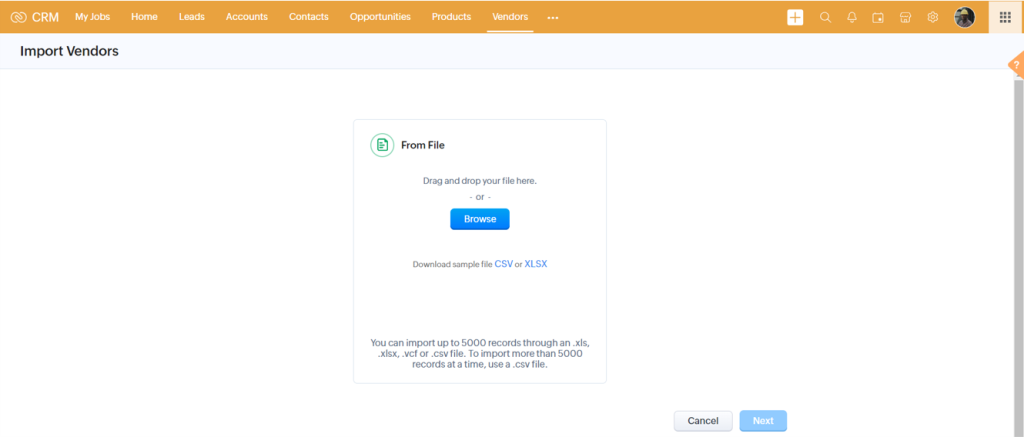
We already are aware of what CRM stands for – Customer Relationship Management. But in business, you must understand there are different significant sectors to run business operations as smoothly as possible. Hence, this software is designed for customers, but for all the entities you have associations with. With this CRM in place, you can create a 360-degree view of the vendor to display all the related details, such as products, activities, contacts, purchase orders, and attachments. Keeping them in one location helps you have easy access to all the information you need – anytime and anywhere.
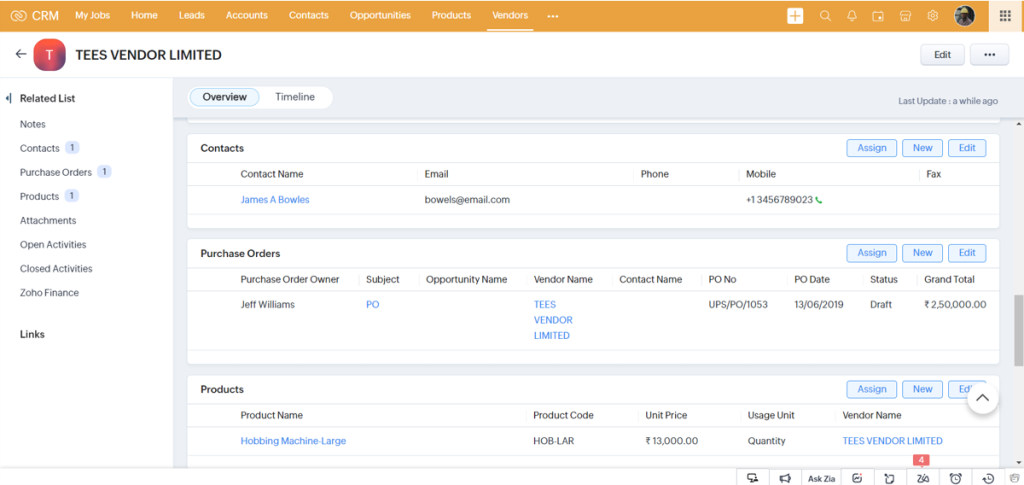
Think about it. As a business owner, won’t you work with several vendors at a time? The number will only grow when you expand. Just like you follow the KPIs of your teams, you must do the same for your vendors.
Some vendors are physically present at your business, and some vendors might operate from separate locations, perhaps from a different state or nation. In such cases, you need to give your vendors a mechanism to track and bill for their work. Hence, there are operational overheads such as invoices, bills, deliveries, payouts, etc for you to track. With Zoho CRM, you can maintain a digital log book to track your vendors, their activity, and performance and shed light on their KPIs for success. You can easily create a separate dashboard or report that is solely dedicated to your vendors.

It is always better to plan before it’s time for execution. Businesses, irrespective of their sizes, require vendors for daily operations. The number of vendors you currently deal with might rise depending on your business. But you would still need to manage them efficiently.
How? With Zoho CRM. It holds the potential to become one of the best cost-effective digital tools that help you strategize a reliable procedure that personalizes, streamlines, and centralizes your vendor activities.
Want to gather more information about Zoho CRM? Our experts are here for you.